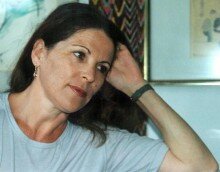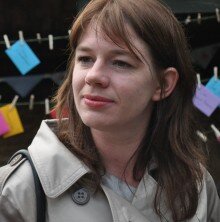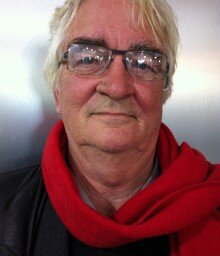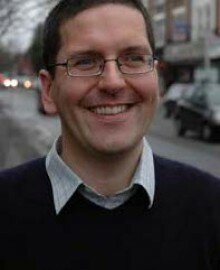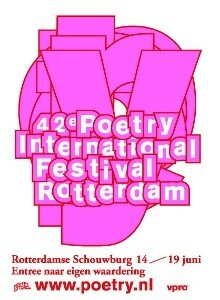Nederlands ►
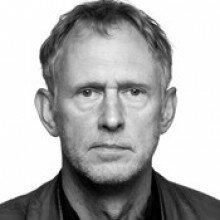
Most of the texts by Eugène Savitzkaya are labelled as ‘novels’, but all of his work – prose, poetry, plays and essays – testify to the poetic glow in which he sees and describes everyday life. The celebration of ‘everyday miracles’, once a leitmotif of the Surrealists, acquires an unobtrusive but extremely personal interpretation in Savitzkaya’s work. His often fragmentary, repetitive “word machines” have nothing psychologising or cerebral about them. Savitzkaya is a poet of the open air, of the painstaking, even delirious observation. His “grating, sputtering, jingling” language aims to “do justice to the air, the wind, and the situation there and now”. With a sometimes sombre, sometimes intimate, but always sensual voice, he sings of metamorphosis, of unity and dissolution. The world appears to him as a garden in which everything and everyone – plants, insects and people – are doomed to change, to melt away and disappear. “You are beautiful as/ something that withers and/ falls to the ground, he once/ dared to say,” writes Savitzkaya in Nouba.
As a son of East European immigrants, Eugène Savitzkaya spent his childhood in the Walloon countryside. His imagination thrived on the fairy stories told to him by his Russian mother. He discovered the Surrealists at a very early age, after which he published a couple of volumes of poetry, which were obsessive and of an exceptional intensity. He did this under the auspices of that other poet of Liège, Jacques Izoard (1936–2008), who was his mentor for a long time. After Mentir (1977), his work was predominantly published by the trendsetting Parisian publishers, Minuit. His work has been greeted with praise by critics and admiration by a faithful French and Belgian readership, but he has continued to live in the hinterland of Liège as a loner, averse to all schools and coteries.
From the 1990s onwards, oppressiveness and darkness in Savitzkaya’s work made way for more lightness and ‘folly’, as one can see in La Folie originelle (1991), Fou civil (1999) and Fou trop poli (2005). He wrote essays about painters (for instance Hieronymus Bosch), and poetic hymns to his children when young: Marin mon coeur (1992), for which he won the Prix Triennal du Roman of the French-speaking Community of Belgium in 1994, and Exquise Louise (2003). In recent years, his poetry performances have attracted notice (Nouba, 2007; Contre l’homme 2010). These are a sort of reconciliation rite, sometimes taking the form of a lengthy toast to the bond between man and wife – “tied on their belly with a handsome sailor’s knot”.
Bibliography
Poetry
Les lieux de la douleur, Éditions Liège des Jeunes Poètes, Liège, 1972
Le coeur de schiste, Atelier de l’Agneau, Liège, 1974
Rue obscure, in collaboration with Jacques Izoard, Atelier de l’Agneau, Liège, 1975
L’empire, with drawings by Veličković, Atelier de l’Agneau, Liège, 1976
Mongolie, plaine sale, Seghers, Paris, 1976
Les chambres de Raphaël, Commune Mesure, Asnières, 1976
Plaisirs solitaires, in collaboration with Jacques Izoard, Atelier de l’Agneau, Luik, 1979
Les couleurs de boucherie, Christian Bourgois, Paris, 1980
Aigle et poisson, with silkscreen prints by Bercaval, Pré Nian, Guenrouet, 1982
Sans titre, with drawings by Alain Le Bras, Musée des Beaux-Arts, Nantes, 1984
Bufo bufo bufo, Minuit, Paris, 1986
Quatorze cataclysmes, met tekeningen van Alain Le Bras, ed. Le Temps qu'il fait, Cognac, 1985
Mamouze, Atelier de l’Agneau, Liège, 1998 (2005)
L'été : papillons, ortie, citrons et mouches, with drawings by Alain Le Bras, La Cécilia, 1991
Cochon farci, Minuit, Paris, 1996
Cénotaphe, Atelier de l’Agneau, Liège, 1998 (2003)
Nouba, Yellow now, Crisnée, 2007 (book with CD)
Novels
Mentir, Minuit, Paris, 1977
Un jeune homme trop gros, Minuit, Paris, 1978
La traversée de l’Afrique, Minuit, Paris, 1979
La Disparition de Maman, Minuit, Paris, 1982
Les Morts sentent bon, Minuit, Paris, 1984
Capolican. Un secret de fabrication, vertelling, Arcane 17, Saint-Herblain, 1986
Sang de chien, Minuit, Paris, 1989
Marin mon cœur, Minuit, Paris, 1992
En vie, Minuit, Paris, 1995
Fou civil, Flohic Éditions, Charenton Le Pont, 1999
Célébration d'un mariage improbable et illimité, Minuit, Paris, 2002
Exquise Louise, Minuit, Paris, 2003
Fou trop poli, Minuit, Paris, 2005
Theatre
Faillite ou les travaux de Hans Weber Evorian, 1979 (unpublished)
La Folie originelle, Minuit, Paris, 1991
Aux prises avec la vie, for the Transquinquennal theatre company, (consisting of ‘Aux prises avec la vie courante’, ‘Est’ and ‘La femme et l’autiste’), Le Fram, Liège, 2002
Convives, voor toneelgezelschap Transquinquennal, 2008 (unpublished)
Various works
Alain Le Bras, portrait en pied, Atelier de l’Agneau, Liège, 1987
Portrait de famille, Librairie Tropismes, Brussels, 1992
Alain Le Bras, by Alain Le Bras, Eugène Savitzkaya and Philippe Bordes, L’Atalante, Nantes, 1993
Jérôme Bosch, Flohic Éditions, Charenton Le Pont, 1994
Saperlotte! Jérôme Bosch, Flohic Éditions, Charenton Le Pont, 1998
Narcisse aux chiens, film by Marie André, 1997, screenplay
Technique tectonique, met Nicolas Kozakis, Yellow now, Crisnée, 2003
Le lait de l’ânesse, fac-simile van het manuscript, Didier Devillez, Brussels, 2008
Propres à rien, short stories 1977–1995, Didier Devillez, Brussels, 2010



